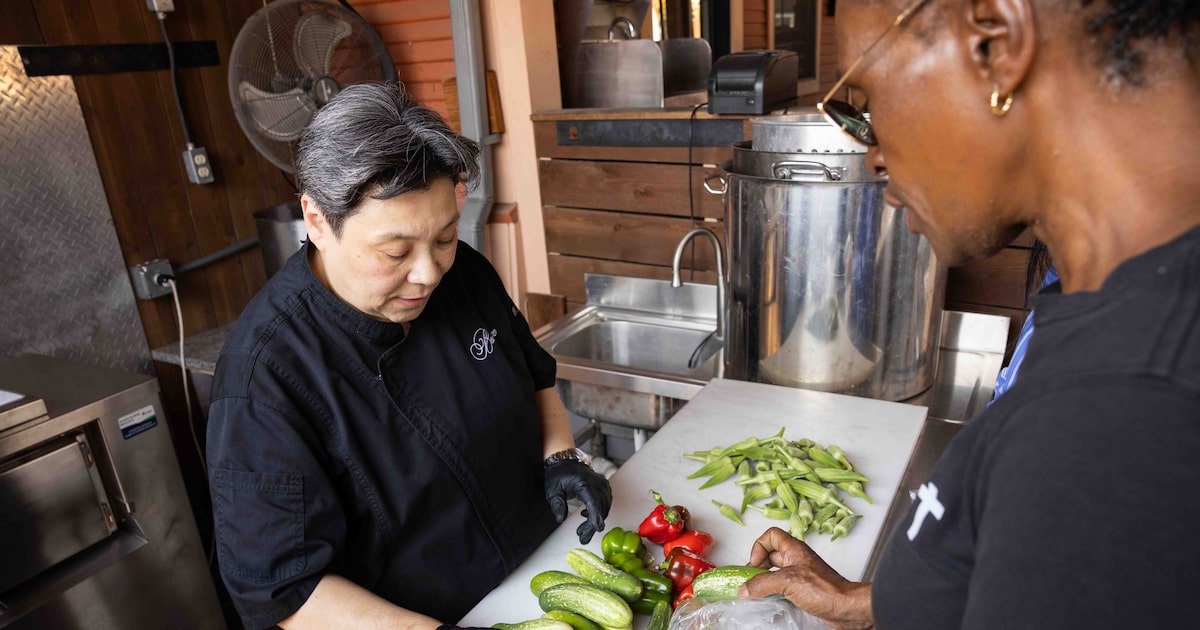The unglamorous work of dumping buckets of egg shells, coffee grounds and all manner of kitchen scraps into an industrial composter is now a daily practice at Dallas’ Restaurant Beatrice, and so is tracking the greenhouse gas emissions of every single purchase and process.
Since the small Oak Cliff restaurant opened in 2022, its mission has been to be as sustainable in its operations as possible, and it recently took a rare step in that pursuit.
To fully understand and improve its climate impact, Restaurant Beatrice completed a comprehensive greenhouse gas emissions audit — an exercise typically conducted by large corporations in places where it is required of them such as California and the European Union.
The audit that analyzed 2024 numbers required months of tediously gathering data, weighing trash, tallying used rubber gloves and documenting every resource that goes into running the B Corp-certified restaurant, said Hanh Ho, a partner in Restaurant Beatrice who spearheaded the effort along with executive chef Michelle Carpenter.
Eat Drink D-FW
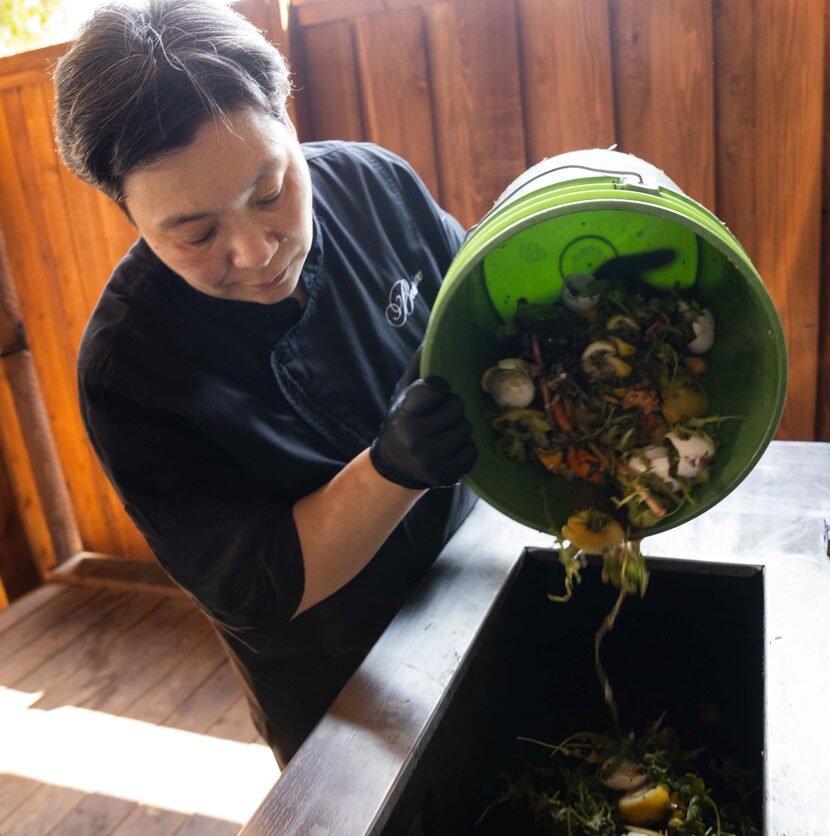
Michelle Carpenter, executive chef and owner of Restaurant Beatrice, adds food scraps and organic waste to the Oklin composting machine at Restaurant Beatrice in Dallas on Monday, Aug. 25, 2025.
Juan Figueroa / Staff Photographer
“In the beginning, it was grueling and demoralizing,” Ho said. “There was not a lot of data when we started doing this, and it was really hard to get going because there are not a lot of restaurants that do this.”
A greenhouse gas audit, which can range in cost from free to thousands of dollars depending on business size and need, is intended to serve as a baseline with which to measure progress in emissions reduction. What Ho and Carpenter said they discovered from their audit is that their restaurant is already doing many things right, but there’s room for improvement.
Since opening the restaurant, Carpenter has sourced local ingredients as much as possible, focused on whole-animal utilization and implemented low-waste food practices. She’s now analyzing the carbon intensity of ingredients on the menu like chicken, scaling back on items like rubber gloves, working to install solar panels and expanding composting efforts with the recent installation of a commercial composting machine.
Running a sustainable and climate-conscious restaurant is often solitary work, especially in Texas, Ho and Carpenter said. It’s common to see restaurants tout meat from local ranches, herbs grown in patio gardens or vegetable scraps saved to make stock, but restaurants taking a full-scale approach to sustainability are few and far between. Ho said they haven’t come across any other restaurant in Texas that has completed a greenhouse gas audit.
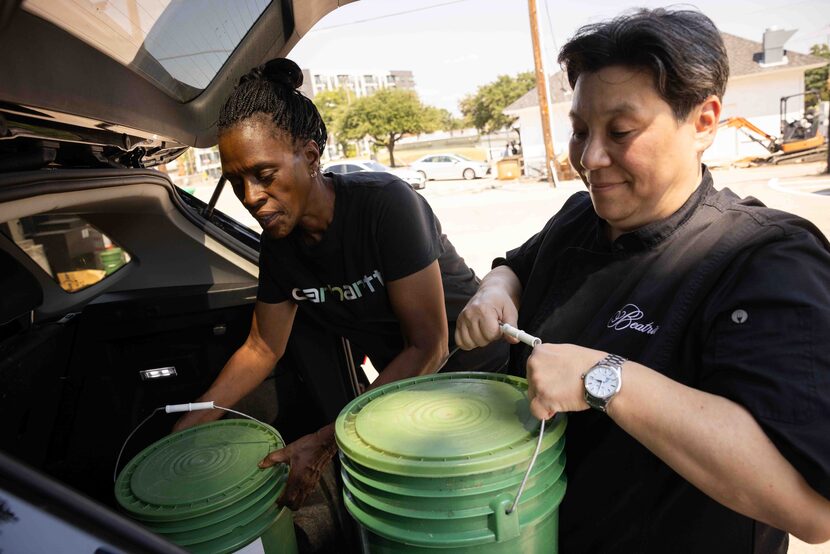
(From left) Kimberly High, owner of Joppy Momma’s Farm, and Michelle Carpenter, executive chef and owner of Restaurant Beatrice, load up buckets of compost from the restaurant into High’s car after exchanging it for fresh vegetables from the farm.
Juan Figueroa / Staff Photographer
The CEO of the Florida-based software company Ho and Carpenter used to conduct their greenhouse gas accounting, North Star Carbon and Impact, said Restaurant Beatrice is the first independent restaurant they have worked with.
“You see large corporate chains do this because they might be publicly traded or have asset managers who own part of the companies,” said North Star CEO Josh Prigge. “To see a single restaurant that is independently owned do this is definitely rare.”
Prigge, who previously worked in the wine industry, said purchased goods and services, known as Scope 3 emissions, tend to be the largest contributors to greenhouse gas emissions for food and beverage companies. Restaurant Beatrice’s audit revealed 70% of its emissions fall into Scope 3.
“Buying local is probably the greatest opportunity for restaurants [to reduce emissions],” he said, “specifically buying from other local, independently owned food producers. It’s about cutting out that transportation used to ship in ingredients from a place like South America or some other state.”
The purpose behind conducting the audit was twofold, Carpenter said: It is an important step in following through on their commitment to being as sustainable as possible, and it helps chart the way for other restaurants.
“What we’re trying to demonstrate to our community is that it is possible to implement these practices now because eventually we’re not going to have a choice,” said Carpenter. “We’re trying to be an example of what’s possible for small businesses. If we can do this with limited resources, I know other restaurants can do this.”
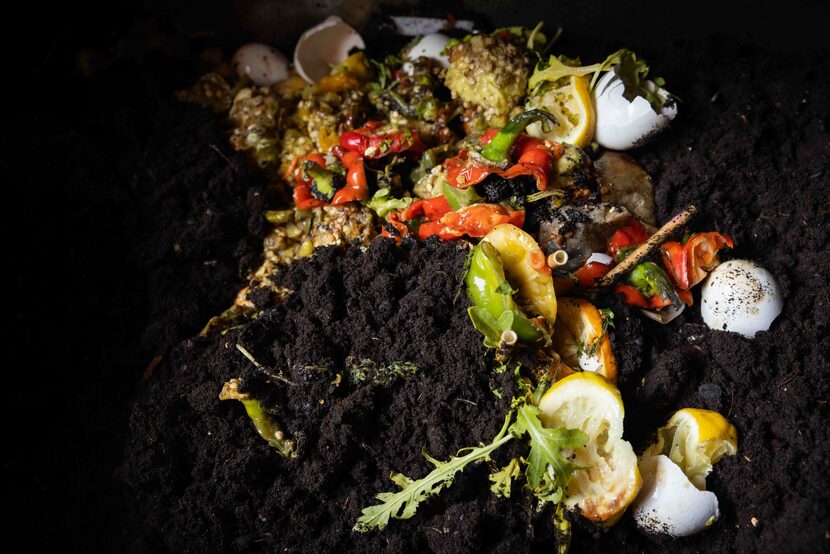
All food scraps and organic waste from Restaurant Beatrice are turned into compost.
Juan Figueroa / Staff Photographer
It’s Carpenter’s hope that their efforts will yield an easier path to sustainability for other restaurants in Texas, she said.
She and Ho have been in on-and-off conversations with the city of Dallas for several years to try to come up with a composting program for restaurants in the city. Composting, Carpenter said, is an impactful way for food businesses to move toward more environmentally responsible practices, and having a municipal program would make it easier to get more restaurants on board.
Restaurant Beatrice’s staff is trained in separating trash and organic materials, including everything that comes off of diners’ plates. Every organic scrap in the restaurant is composted, and the compost goes to Joppy Momma’s Farm in Dallas’ Joppa neighborhood.
Kimberly High, owner of the community farm, stops by the restaurant regularly to trade fresh produce for compost, and to collect the restaurant’s empty oyster shells to sprinkle across the soil of her farm to add nutrients and help balance pH levels.
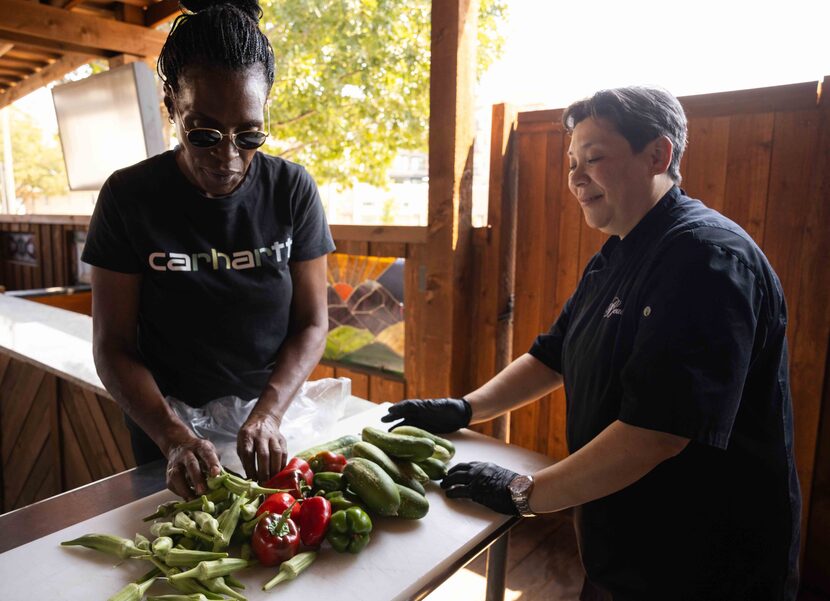
Michelle Carpenter (right), executive chef and owner of Restaurant Beatrice, has a partnership with Kimberly High, who owns Joppy Momma’s Farm. On a weekly basis, High delivers fresh produce in exchange for the restaurant’s compost.
Juan Figueroa / Staff Photographer
Restaurant-producer relationships like this are critical for a healthy local food system, Carpenter said. That’s why she and Ho also partnered with Carrollton-based Ocean Beauty Seafoods to create a Gulf seafood program to offer more locally sourced seafood options to restaurants. Through that program, Restaurant Beatrice sources grouper, tile fish, snapper, blue crab, shrimp and oysters.
Carpenter acknowledges implementing sustainable practices often comes with added cost, which is a tough sell to restaurants already facing high operating costs and small profit margins. Sourcing locally farmed catfish, for example, can be double or triple the price of frozen catfish from overseas, she said, but the difference in quality and climate impact between the two is just as stark as their price tags.
She sees the added expenses and effort that come along with making environmentally conscious changes as not only worthwhile but a matter of ethical responsibility for restaurants.
“I think people think it may be too difficult or too hard,” Carpenter said, “and it can be hard, but we have to do the right thing. If we don’t change our practices, it’s going to cost the environment more.”
Restaurant Beatrice is located at 1111 N Beckley Ave., Dallas. restaurantbeatrice.com.
